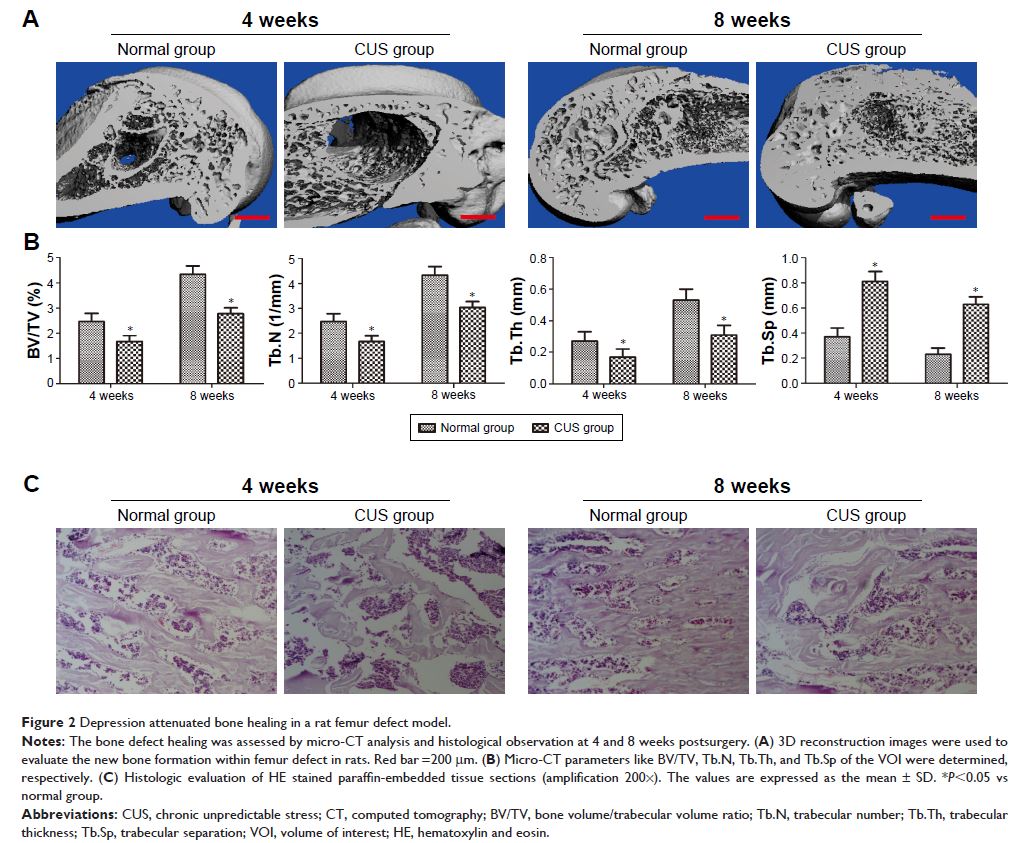9 0 4 9 6
论文已发表
注册即可获取德孚的最新动态
IF 收录期刊
- 2.6 Breast Cancer (Dove Med Press)
- 3.9 Clin Epidemiol
- 3.3 Cancer Manag Res
- 3.9 Infect Drug Resist
- 3.6 Clin Interv Aging
- 4.8 Drug Des Dev Ther
- 2.8 Int J Chronic Obstr
- 8.0 Int J Nanomed
- 2.3 Int J Women's Health
- 3.2 Neuropsych Dis Treat
- 4.0 OncoTargets Ther
- 2.2 Patient Prefer Adher
- 2.8 Ther Clin Risk Manag
- 2.7 J Pain Res
- 3.3 Diabet Metab Synd Ob
- 4.3 Psychol Res Behav Ma
- 3.4 Nat Sci Sleep
- 1.9 Pharmgenomics Pers Med
- 3.5 Risk Manag Healthc Policy
- 4.5 J Inflamm Res
- 2.3 Int J Gen Med
- 4.1 J Hepatocell Carcinoma
- 3.2 J Asthma Allergy
- 2.3 Clin Cosmet Investig Dermatol
- 3.3 J Multidiscip Healthc

抑郁对大鼠骨折愈合和成骨细胞分化的影响
Authors Nie C, Wang Z, Liu X
Received 19 March 2018
Accepted for publication 9 May 2018
Published 29 June 2018 Volume 2018:14 Pages 1705—1713
DOI https://doi.org/10.2147/NDT.S168653
Checked for plagiarism Yes
Review by Single-blind
Peer reviewers approved by Prof. Dr. Roumen Kirov
Peer reviewer comments 2
Editor who approved publication: Professor Wai Kwong Tang
Background: Depressive disorder has been proven to be associated with
disturbed bone metabolism. However, the effect of depression on fracture
healing still lacks evidence.
Materials and
methods: A rat depressive model was first
established by exposing the animals to chronic unpredictable stress, which was
assessed using the sucrose preference test, forced swimming test, and open
field test. Subsequently, the bone repairing ability was detected by
micro-computed tomography and histological analysis of the femoral condyle
defect rats with or without depression. To further investigate the potential
mechanisms of depression on fracture healing, the osteogenic differentiation
and autophagic level were compared between the bone marrow mesenchymal stem
cells (BMSCs) derived from depressive and normal rats.
Results: Our results showed that rats with depressive disorder
significantly slowed the healing process at 4 and 8 weeks postinjury.
Furthermore, the osteogenic potential and autophagy remarkably decreased in
BMSCs from the depressive rats, suggesting an inherent relationship between
autophagy and osteogenic differentiation. Finally, rapamycin, an autophagic
agonist, significantly improved osteogenic differentiation of depressive BMSCs
through autophagy activation.
Conclusion: The present study indicated that depression had a negative effect on
fracture healing with low osteoblast differentiation of BMSCs. Also, autophagy
activation in BMSCs offers a novel therapeutic target for depressive patients
with poor fracture healing.
Keywords: depression, fracture healing, osteoblast differentiation, autophagy,
bone marrow mesenchymal stem cells
